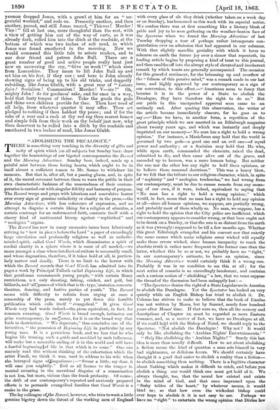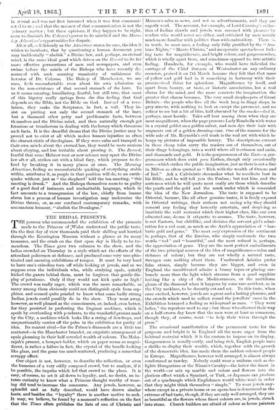"ABOLISHING THE DECALOGUE."
THERE is something very touching in the diversity of gifts and unity of spirit which (on all subjects but Sunday beer) draw together the heartstrings of our bigoted contemporaries the Record and the Morning Advertiser. Sunday beer, indeed, sends up a painful mist between those loving hearts, which ought to be in itself almost a sufficient reason to Mr. Somes to withdraw his measure. But that is, after all, but a passing gloom, and, in spite of it, the sacred covenant between them to warn the public in their own characteristic fashions of the unsoundness of their contem- poraries is carried out with singular fidelity and harmony of purpose. The Record weeps and prays with laborious and convulsive horror over every sign of genuine catholicity or charity in the press,—the Morning Advertiser, with less coherence of expression, and no attempt to disguise a certain liking for a religion of stimulus, a certain contempt for an unfermented faith, contents itself with a cheery kind of sentimental hiccup against "sophistical" and " neologiau " organs.
The Record has now in many successive issues been laboriously striving to " hew in piecs before the Lord " a paper of exceedingly large circulation and professedly religious as well as catholic- minded spirit, called Good Words, which disseminates a spirit of cordial charity in a sphere where it is most of all needed,—we mean amongst a class whose intellectual culture is necessarily small, and whose dogmatism, therefore, if it takes hold at all, is particu- larly narrow and deadly. There is no limit to the horror with which the Record records that Good Words has admitted into its pages a work by Principal Tulloch called Beginning Life, in which that gentleman recommends young people, " with certain flimsy restrictions, net only shooting, fishing, cricket, and golf, but billiards, and all:games of which that is the type,' oratorios, concerts. theatres, dancing, and festive parties of youth." The Record seems with difficulty to refrain from urging at once a censorship of the press, merely to put down this horrible publication which calls itself " evangelical." It gives Good Words very bad words indeed—the pious equivalent, in fact, for common swearing. Good Words is broad enough, intimates our grim contemporary, in onesense, for it is on the broad way that leads to destruction. " We deprecate," thus concludes one of the invectives, " the possession of Beginning Lift in particular by any young man. It is a pernicious book, and we fear that he who begins life trusting such a guide and moulded by such influences, will make but a miserable ending of it in this world and will have a fearful beginning 1 of life in that which is to come." One can scarcely read this without thinking of the exhortation which the artist Fuseli, we think it was, used to address to his wife when she: betrayed signs ofkinpatience ; —" Swear a little, my dear, it will ease you mightily." Evil as all licence to the temper is, mental swearing in the sacerdotal disguise of a commination is not less, but more, vicious than the frank profanity. Of course, the drift of our contemporary's repeated and anxiously prepared efforts is to persuade evangelical families that Good Words is a snake in the grass.
The lay colleague ever hope to abolish it it is not easy to see. Perhaps we have no "right " to entertain the wrong opinion that Divine law is sternal and was not first invented when it was first communi- cyt el to us ; and that the manner of that communication is not the :nimary matter ; but these opinions, if they happen to be right, seem to diminish Dr. Colenso's power to do mischief and the Morn- iag Advertiser's opportunities for despair. After all,—deliriously as the Advertiser states its case, the idea it wishes to inculcate, that by questioning a human document you may incidentally " abolish " a Divine law, and, perhaps, an eternal mind; is the same ideal goad which drives on the Record to its far more effective persecutions of men and newspapers, and even swims before the minds of the Bishops who have recently de- nounced with such amazing unanimity of unfairness the heresies of Dr. Colenso. The Bishop of Manchester, we are sure, feels uncomfortable even about his own admission as to the non-existence of that second stomach of the bare. To us it seems amazing, humiliating, fearful, but still true, that most of this bigotry really springs from the dim feeling that God depends on the Bible, not the Bible on God. Instead of a reve- lation, they make the Scriptures, in fact, a veil. They in- sist on putting not only the second stomach of the hare, but a thousand other petty and problematic facts, between themselves and the Divine mind, and then naturally enough get ferocious or treacherous in dealing with the heresy which threatens such facts. It is the dreadful dream that the Divine justice may be proved not to exist at all which makes human injustice so often the characteristic of theologians. If they were calm and tranquil in their own minds about the eternal law, they would be more anxious about obeying, and less irritable about proving it. The Record, fearful that some Hebrew root or new science may upset the Divine law after all, strikes out with a blind fury, which proposes to de- fend by breaking it in many places at once. The Morning Advertiser, feeling an uncomfortable quaking of everything stable within, attributes it, as people in that position will do, to an earth- quake without, just as " the shepherd' told the tea-meeting, " this meeting is drunk." - And the Bishops themselves seem to us guilty of a good deal of insincere and uncharitable language, which in fact amounts to a transgression of the law, chiefly from insane alarm lest a process of human investigation may undermine the Divine throne, or, as our confused contemporary remarks, with unconscious humour, " abolish the Decalogue."































 Previous page
Previous page